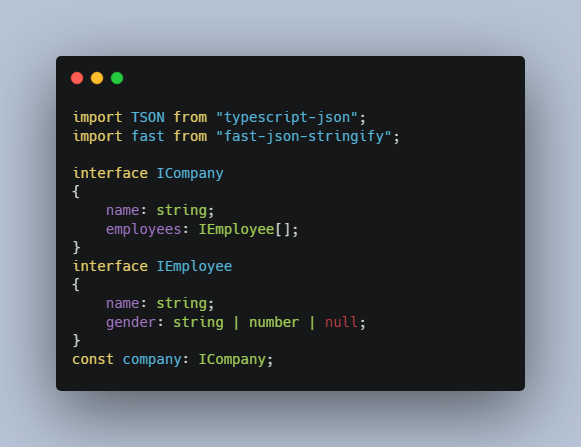TypeScript-JSON
2x faster JSON.stringify() function with only one line.
import TSON from "typescript-json";
TSON.stringify<T>(input);
Introduction
typescript-json is a wrapper library of fast-json-stringify, which can generate JSON string 2x faster than the native JSON.stringify() function. Also, typescript-json doesn’t need any JSON schema definition. It just requires only one line: TSON.stringify<T>(input).
If you choose other similar libraries like ajv or fast-json-stringify, you’ve to define a complicated JSON schema that is different from the TypeScript type system. Besides, typescript-json requires only one line with your own TypeScript type definition. You don’t need any extra JSON schema definition.
Look at the below code and feel how typescript-json is powerful.
import TSON from "typescript-json";
import fast from "fast-json-stringify";
interface ICompany
{
name: string;
employees: IEmployee[];
}
interface IEmployee
{
name: string;
gender: string | number | null;
}
const company: ICompany;
//----
// TSON requires only one line
//----
// Reusable stringfy function
const stringify = TSON.createStringifier<ICompany>();
stringify(company);
// Direct stringify function call
//
// The type would be stored in the global memory
// It would be reused whenever the same type has come
TSON.stringify<ICompany>(company);
//----
// "fast-json-stringfy" requires complicated JSON schema
//----
fast({
type: "object",
properties: {
name: {
type: "string",
nullable: false,
},
employees: {
type: "array",
items: {
type: "object",
properties: {
name: {
type: "string",
nullable: false,
},
gender: {
oneOf: [
{ type: "string" },
{ type: "number" }
],
nullable: true
}
}
},
nullable: false
}
}
})(company);
Setup
NPM Package
At first, install this typescript-json by the npm install command.
Also, you need additional devDependencies to compile the TypeScript code with transformation. Therefore, install those all libraries typescript, ttypescript and ts-node. Inform that, the ttypescript is not mis-writing. Therefore, do not forget to install the ttypescript.
npm install --save typescript-json
# ENSURE THOSE PACKAGES ARE INSTALLED
npm install --save-dev typescript
npm install --save-dev ttypescript
npm install --save-dev ts-node
tsconfig.json
After the installation, you’ve to configure the tsconfig.json file like below. Add the new property transform and its value typescript-json/lib/transform into the compilerOptions.plugins array.
{
"compilerOptions": {
"plugins": [
{
"transform": "typescript-json/lib/transform"
}
]
}
}
After the tsconfig.json definition, you can compile typescript-json utilized code by using the ttypescript. If you want to run your TypeScript file through the ts-node, use -C ttypescript argument like below:
# COMPILE
npx ttsc
# WITH TS-NODE
npx ts-node -C ttypescript
webpack
If you’re using a webpack with the ts-loader, configure the webpack.config.js file like below:
const transform = require('typescript-json/lib/transform').default
module.exports = {
// I am hiding the rest of the webpack config
module: {
rules: [
{
test: /\.ts$/,
exclude: /node_modules/,
loader: 'ts-loader',
options: {
getCustomTransformers: program => ({
before: [transform(program)]
})
}
}
]
}
};
Features
Functions
export function stringify<T>(input: T): string;
export function createStringifier<T>(): (input: T) => string;
typescript-json provides only two functions, stringify() and createStringifier().
The first stringify() is a function who returns the JSON string directly. Also, the type you’d put into the generic argument would be stored in the global memory and reused whenever calling the stringify() function with the same type.
The second createStringifier() is a function who returns another function that can generate the JSON string. The createStringifier() is not enough convenient like stringify(), however it doesn’t consume the global memory. Also, the returned function from the createStringifier() is always reusable until you forget the function variable.
| Method | Strength | Weakness |
|---|---|---|
stringify() |
Convenient to use | Use global memory |
createStringifier() |
Save global memory | Inconvenient to manage |
public
When you put a class type into this typescript-json, only public members would be converted to JSON string. The private or protected members would be all ignored.
toJSON()
fast-json-stringify is not supporting the toJSON() method. If such unsupported situation keeps for a long time, I promise you that I’ll fix the problem even by developing the JSON conversion logic by myself.
Appendix
Nestia
My another library using this
typescript-json.
https://github.com/samchon/nestia
Automatic SDK and Swagger generator for the NestJS, evolved than ever.
nestia is an evolved SDK and Swagger generator, which analyzes your NestJS server code in the compilation level. With nestia and compilation level analyzer, you don’t need to write any swagger or class-validator decorators.
Reading below table and example code, feel how the “compilation level” makes nestia stronger.
| Components | nestia::SDK |
nestia::swagger |
@nestjs/swagger |
|---|---|---|---|
| Pure DTO interface | ✔ | ✔ | ❌ |
| Description comments | ✔ | ✔ | ❌ |
| Simple structure | ✔ | ✔ | ✔ |
| Generic type | ✔ | ✔ | ❌ |
| Union type | ✔ | ✔ | ▲ |
| Intersection type | ✔ | ✔ | ▲ |
| Conditional type | ✔ | ▲ | ❌ |
| Auto completion | ✔ | ❌ | ❌ |
| Type hints | ✔ | ❌ | ❌ |
2x faster JSON.stringify() |
✔ | ❌ | ❌ |
| Ensure type safety | ✅ | ❌ | ❌ |
// IMPORT SDK LIBRARY GENERATED BY NESTIA
import api from "@samchon/shopping-api";
import { IPage } from "@samchon/shopping-api/lib/structures/IPage";
import { ISale } from "@samchon/shopping-api/lib/structures/ISale";
import { ISaleArticleComment } from "@samchon/shopping-api/lib/structures/ISaleArticleComment";
import { ISaleQuestion } from "@samchon/shopping-api/lib/structures/ISaleQuestion";
export async function trace_sale_question_and_comment
(connection: api.IConnection): Promise<void>
{
// LIST UP SALE SUMMARIES
const index: IPage<ISale.ISummary> = await api.functional.shoppings.sales.index
(
connection,
"general",
{ limit: 100, page: 1 }
);
// PICK A SALE
const sale: ISale = await api.functional.shoppings.sales.at
(
connection,
index.data[0].id
);
console.log("sale", sale);
// WRITE A QUESTION
const question: ISaleQuestion = await api.functional.shoppings.sales.questions.store
(
connection,
"general",
sale.id,
{
title: "How to use this product?",
body: "The description is not fully enough. Can you introduce me more?",
files: []
}
);
console.log("question", question);
// WRITE A COMMENT
const comment: ISaleArticleComment = await api.functional.shoppings.sales.comments.store
(
connection,
"general",
sale.id,
question.id,
{
body: "p.s) Can you send me a detailed catalogue?",
anonymous: false
}
);
console.log("comment", comment);
}
Archidraw
I have special thanks to the Archidraw, where I’m working for.
The Archidraw is a great IT company developing 3D interior editor and lots of solutions based on the 3D assets. Also, the Archidraw is the first company who had adopted typescript-json on their commercial backend project, even typescript-json was in the alpha level.
저희 회사 “아키드로우” 에서, 삼촌과 함께 일할 프론트 개발자 분들을, 최고의 대우로 모십니다.
“아키드로우” 는 3D (인테리어) 에디터 및 이에 관한 파생 솔루션들을 만드는 회사입니다. 다만 저희 회사의 주력 제품이 3D 에디터라 하여, 반드시 3D 내지 랜더링에 능숙해야 하는 것은 아니니, 일반적인 프론트 개발자 분들도 망설임없이 지원해주십시오.
그리고 저희 회사는 분위기가 다들 친하고 즐겁게 지내는 분위기입니다. 더하여 위 nestia 나 typescript-json 및 payments 등, 제법 합리적(?)이고 재미난 프로젝트들을 다양하게 체험해보실 수 있습니다.
- 회사소개서: archidraw.pdf
- 기술 스택: React + TypeScript
- 이력서: 자유 양식
- 지원처: [email protected]







